Sustainable Agricultural Policy in Nigeria
- Saweda Liverpool-Tasie
- Associate Professor
- Department of Agriculture, Food, and Resource Economics
- College of Agriculture and Natural Resources
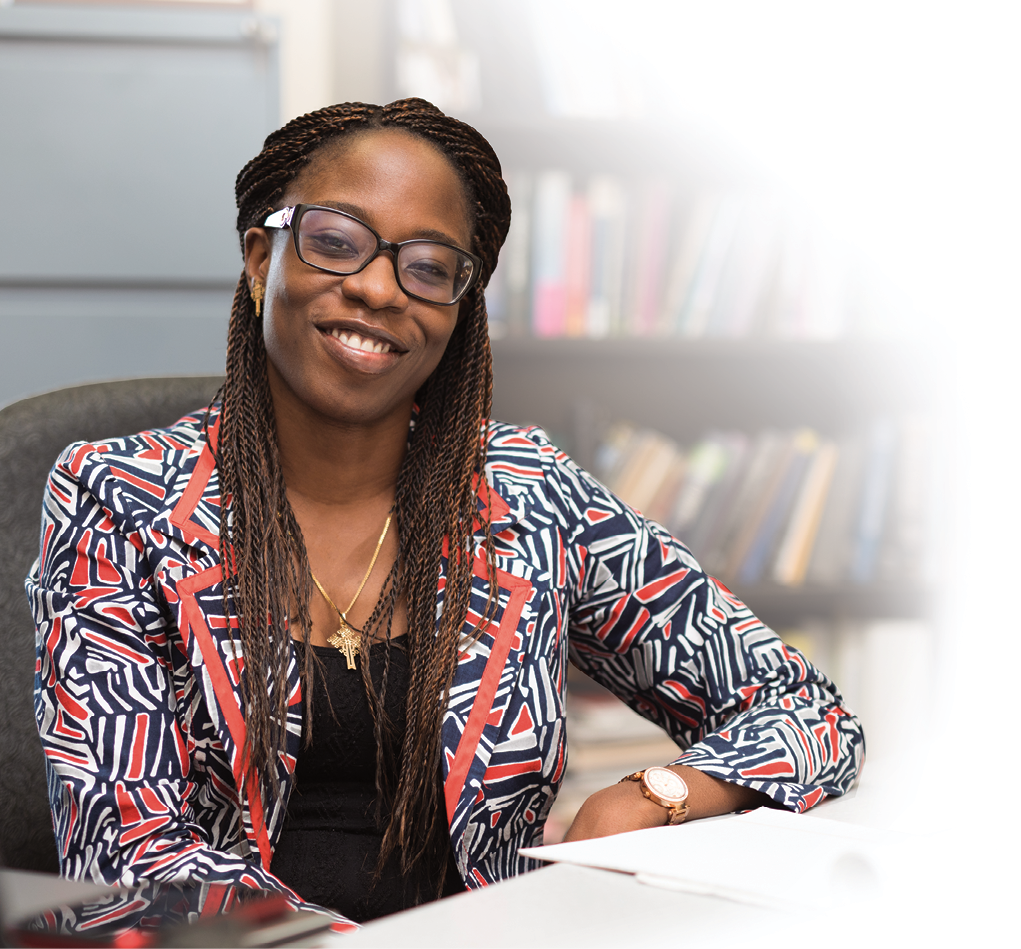
Saweda Liverpool-Tasie leads the USAID-funded Nigeria Agricultural Policy Project. Photo by Khalid Ibrahim.
 Nigeria is the seventh most populous country in the world and is expected to overtake the United States for the number three spot by 2050. While it has the largest economy on the African continent, it suffered a setback earlier in the decade with the drop in the price of oil, its number one revenue source. According to Saweda Liverpool-Tasie, Department of Agriculture, Food, and Resource Economics, the resulting devaluation of the Nigerian naira against the U.S. dollar, along with a fast growing population, are contributing to the prioritization of the agricultural sector in Nigeria.
Nigeria is the seventh most populous country in the world and is expected to overtake the United States for the number three spot by 2050. While it has the largest economy on the African continent, it suffered a setback earlier in the decade with the drop in the price of oil, its number one revenue source. According to Saweda Liverpool-Tasie, Department of Agriculture, Food, and Resource Economics, the resulting devaluation of the Nigerian naira against the U.S. dollar, along with a fast growing population, are contributing to the prioritization of the agricultural sector in Nigeria.
Dr. Liverpool-Tasie grew up in Jos, the capital city of Plateau State, Nigeria, where she developed an interest in issues around poverty and farmer productivity. "When you think of poverty in many developing countries," she said, "it's very closely tied with agriculture. Thus, I became interested in issues of smallholder productivity in sub-Saharan Africa a long time ago. That's what informed my field of study."
Nigeria is one of eight African countries or regions partnering with researchers from MSU's Feed the Future Innovation Lab for Food Security Policy, part of the U.S. government's Global Hunger and Food Security Initiative. Liverpool-Tasie leads the Nigeria Agricultural Policy Project, a five-year, USAID-Nigeria funded collaboration with the International Food Policy Research Institute (IFPRI) and many Nigerian partners. The project's objectives are to strengthen capacity in evidence-based policy processes in agriculture, foster informed policy dialogue among all agricultural stakeholders, and provide support for Nigerian state and federal governments in implementing agricultural policies.
Building Capacity in the Aquaculture Industry
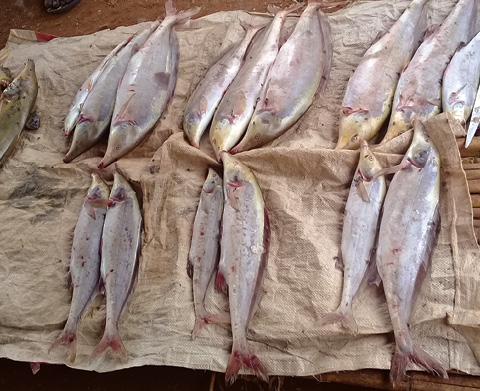
Fish from a fish hatchery in Kebbi State. Photo courtesy of Woji Gwoni
Liverpool-Tasie leads a suite of research projects on food systems transformation in Nigeria, looking specifically at the consumption patterns and value chains of three agricultural subsectors—purchased and packaged goods, poultry, and aquaculture.
Growth in urban populations, combined with modest economic recovery, is resulting in an increase in protein consumption, especially chicken and fish, driving growth in the poultry and aquaculture industries. Fish consumption, for example, has increased rapidly in the last five to ten years. "Just recently, we're seeing that, in some parts of Nigeria, 90 percent of people are consuming fish in a given week. And in the country as a whole, 70 percent," said Liverpool-Tasie. "So you ask, what does it mean for how this increased demand is being met? Where is it coming from?"
Asking and answering these kinds of questions is fundamental to informing the national policy process, a process that Liverpool-Tasie believes is sustainable only when all stakeholders are constantly involved. "One approach could be for MSU or some other international organization to always do the training or research," she said. "But for it to be sustainable, it's necessary for those who are actually involved on the ground and are engaged with the policy makers on a more frequent basis, to have the capacity to do that."
Last year, she and her team began scoping the industry—talking with the various actors in the fish value chains to find out what's been happening in the industry over the last ten years. Then they brought together all the actors—fish traders, maize traders, farmer groups, entrepreneurs, government representatives, and researchers—to a capacity-building training to look at best practices in research design and data collection and to apply those techniques to gain an accurate perspective of the aquaculture subsector.
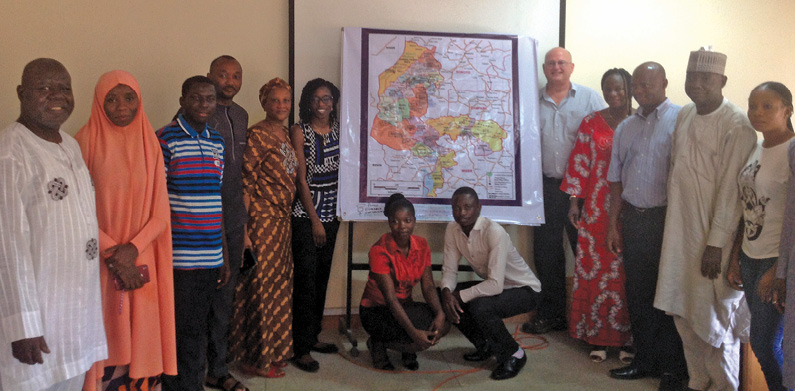
Aquaculture workshop participants include Woji Gwoni (fourth from left), Saweda Liverpool-Tasie (sixth from left), and Tom Reardon (fifth from right). Photo courtesy of Woji Gwoni.
By the end of the training, participants had not only gained skill in the research process, but had gained a deep appreciation for the collaborative approach. Many said that they had never had this kind of dialogue before and expressed a desire to continue the sharing of knowledge, research agendas, and research outcomes.
Mr. Woji Gwoni has been a fish hatchery operator in northern Nigeria since 2006, when he saw an opportunity to meet the increased demand for fish in the north. "I started in Kaduna State, and back then all the sources of fish seedlings were from the south," he said. "So I decided to invest to meet the demand requirements for quality fish seedlings in the north."
While the return on investment has been rewarding, Mr. Gwoni says there are also challenges, such as unskilled manpower, inadequate power supply, inelastic fish prices, inbreeding in the sector, and lack of equipment to monitor water quality. He believes attending workshops, such as the one offered by Liverpool-Tasie's team, helps address these challenges. "We have to get experience of how challenges we are faced with can be tackled through the use of better technology, capacity building, and international contacts for equipment and other inputs," he said.
Teamwork from Beginning to End
Right after the training, the MSU team began working with Nigerian faculty and students on the research process. "We always make sure that we work in teams," said Liverpool-Tasie. "We work from the beginning, and we do it all together. That's our way of doing capacity building."
Professor Tom Reardon, Department of Agriculture, Food, and Resource Economics, has been doing Africa-focused research since 1984, and has spent approximately seven years on the continent. He worked with Liverpool-Tasie to conduct the workshop, and is part of the collaborative research team doing an inventory in Niger and Kebbi States on all segments of the fish farm value chain, from hatcheries to feed mills to farms to wholesalers to retailers.
According to Reardon, this is the first time such information has been collected in Nigeria. "This will be very rare and new and valuable information for governments, who lack information on the details of how the fish farming supply chains and farms themselves are structured and working, as well as industries there, such as the fish farmers, fish processors, and other commercial actors," said Reardon. "This is so important to help all these actors design good strategies and policies."
Training One to Train Others
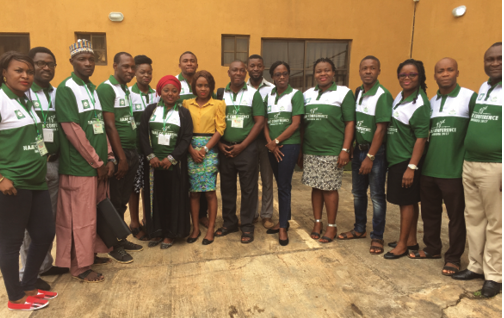
Saweda Liverpool-Tasie (6th from right) poses with Aisha Ibrahim (6th from left) and other young Nigerian scholars supported by the USAID-Nigeria project to participate in the 2017 conference of the Nigerian Association of Agricultural Economists, in Ogun State, Nigeria. Photo courtesy of Aisha Ibrahim.
These capacity-building efforts don't always happen on the ground in Nigeria. One part of the Nigeria Project that Liverpool-Tasie truly loves allows her to reach Nigeria from her own office back home in East Lansing. In 2016, the Nigeria Agricultural Policy Project launched the Nigerian Scholars Program, in which competitively selected graduate students from Nigeria spend one or two semesters at MSU. The idea is that MSU faculty mentors will work with them, and often their Nigerian supervisors, on a research project that will be useful to them upon return to Nigeria.
Aisha Ibrahim was a scholar in Spring Semester 2017. She was mentored by Liverpool-Tasie on her research on agglomeration economies (economic benefits derived from enterprises or firms clustered in a location), with a specific focus on parboilers in rice processing clusters in Kano State (in northern Nigeria).
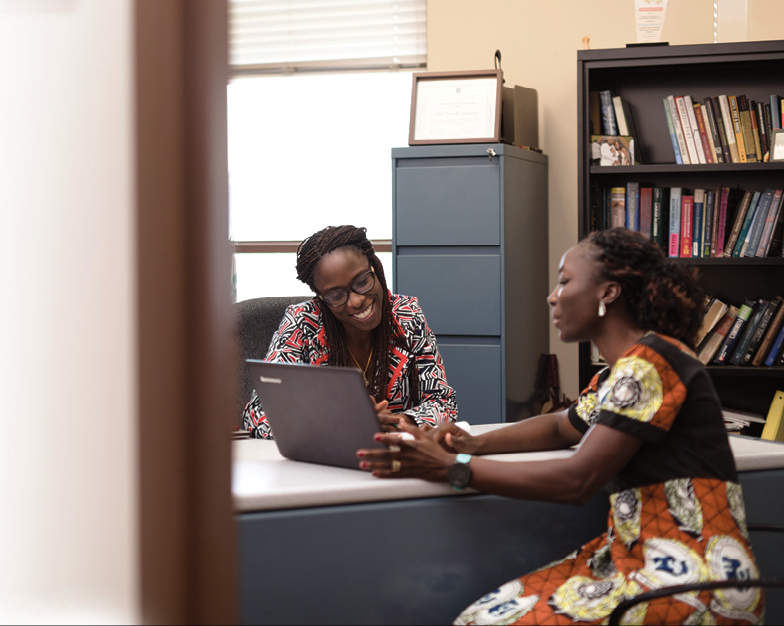
Liverpool-Tasie meets with a Ph.D. student working with her on food systems transformation in Nigeria. Photo by Khalid Ibrahim.
"It was my first time outside Nigeria, and I was ready to learn a lot and make my country and school proud," said Ibrahim. "I hoped to learn how to use statistical packages in data analysis but upon getting to MSU, I got the full package." Besides her coursework and research, she had opportunities to make presentations, write policy briefs, and make important connections. "I was able to accomplish my goals and even other benefits I was not expecting," she said. "I was able to establish a very strong network while I was at MSU, which I kept even upon my return to Nigeria."
Back in Nigeria, she has continued her involvement with the scholars program by conducting workshops on the poultry value chain, presenting at conferences, contributing resources—such as textbooks—to her colleagues, and doing weekly data collections with poultry farmers in Kaduna State.
"These scholars are just amazing and when they go back they're doing so much," said Liverpool-Tasie.
Another scholar, for example, has gone back to Nigeria and trained over 400 people on how to use a statistical software called STATA, often used for policy analysis, and has also trained faculty at various institutions of higher learning across Nigeria as well as government officials across State ministries of agriculture. These examples highlight the scholar program's train-the-trainer approach.
"We have what we call train one to train others—that's one of our mottos," Liverpool-Tasie said. "We can't bring a thousand students here. But maybe we can still reach a thousand Nigerian students (and other stakeholders) if we have fifteen or twenty who come here and are well trained in some particular skills they can use in Nigeria and train others."
- Written by Amy Byle, University Outreach and Engagement